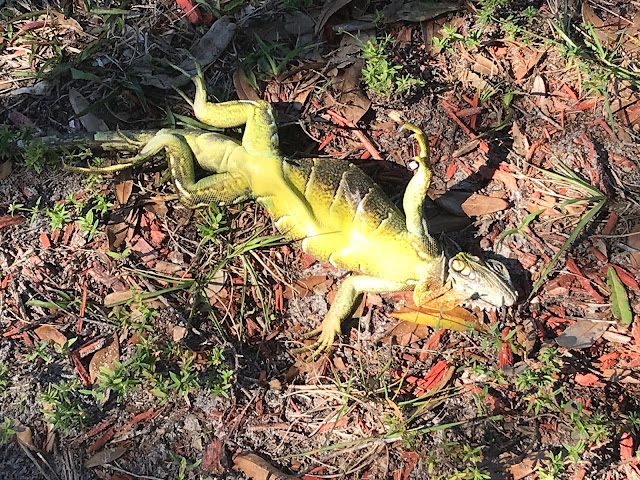Frozen iguanas falling from trees during cold snap in Florida
Frozen iguanas falling from trees during cold snap in Florida
MIAMI BEACH, Fla. - It's so icy in Florida that iguanas are tumbling from their roosts in rural trees. Temperatures plunged underneath 40 degrees Fahrenheit early Thursday in parts of South Florida, as per the National Weather Service in Miami.
That is sufficiently nippy to immobilize the green iguanas regular in the area.
Palm Beach Post feature writer Frank Cerabino tweeted a photo of an iguana lying gut up alongside his swimming pool.
The scene at my backyard swimming pool this 40-degree South Florida morning: A frozen iguana. pic.twitter.com/SufdQI0QBx— Frank Cerabino (@FranklyFlorida) January 4, 2018
The iguanas have a good chance of thawing out if you move them in the sun. Just be careful @CBS12 pic.twitter.com/Qn2w6NFedD— Maxine Bentzel (@MaxineBentzel) January 4, 2018
It’s so cold the iguanas are freezing and falling out of trees @CBS12 pic.twitter.com/9nCTfKPaGJ— Maxine Bentzel (@MaxineBentzel) January 4, 2018
Be that as it may, good natured inhabitants finding hardened iguanas are encouraged to allow them to sit unbothered, as the creatures may feel undermined and nibble once they warm up.
"Try not to accept that they're dead," said Kristen Sommers, who directs the nonnative fish and untamed life program for the Florida Fish and Wildlife Conservation Commission.
The wanton animals local to Central and South America begin to get slow when temperatures fall beneath 50 degrees Fahrenheit, Sommers said. In the event that temperatures dip under that, iguanas solidify up.
"It's excessively frosty for them, making it impossible to move," she said.
They're by all account not the only reptiles paralyzed by the current week's chilly spell: Sea turtles likewise solidify up when temperatures fall. The natural life commission's scientists have been safeguarding frosty dazed ocean turtles discovered coasting lazily on the water or close shore, however no such protect exertion is gotten ready for iguanas.
Green iguanas are an obtrusive species in Florida known for eating through finishing and burrowing tunnels that undermine foundation. They can develop to more than 5 feet long, and their droppings can be a potential wellspring of salmonella microscopic organisms, which causes intestinal disease.
The natural life commission has started holding workshops to prepare mortgage holders and property supervisors to trap or oversee iguanas. The reptiles might be simpler to come down with this week when it's bug, Sommers said.
"This gives a chance to catch a few, yet I don't know it will be sufficiently icy or sufficiently long to have a sufficient effect," she said. "Much of the time, they will warm go down and move around once more, unless they're euthanized."
In 2010, a two-week-long frosty spell with temperatures beneath 40 degrees Fahrenheit executed off numerous iguanas, alongside Burmese pythons and other obtrusive species that flourish in South Florida's subtropical atmosphere. Those populaces have since bounced back.
Somewhere else in Florida, the impacts of the winter storm moving up the East Coast were less outlandish. It snowed quickly Wednesday in the state's capital, Tallahassee, without precedent for a long time.





No comments